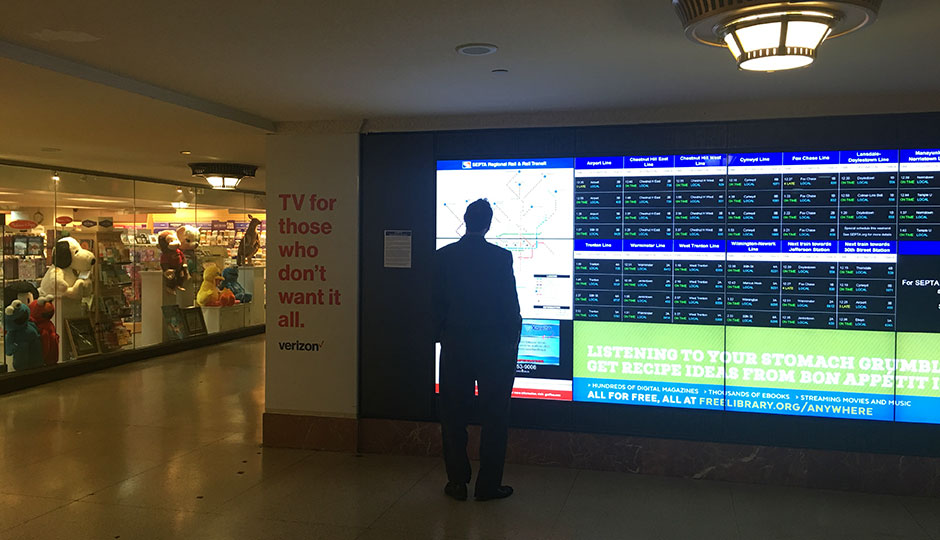Verizon, City Could Tussle Over Fios Franchise Agreement

An ad for Verizon Fios in Suburban Station. (Photo: Dan McQuade)
Verizon says it’s fulfilled its contractual obligations to roll out Fios to the entire city. Philadelphia isn’t so sure.
Earlier this month, the city asked residents to let them know if they’d tried to get Verizon Fios but were told it was not available in their area. Verizon signed a franchise agreement with the city for its Fios television service in early 2009. One requirement, standard in most franchise agreements in American cities, was for Verizon to have the entire city covered with Fios service by February of this year.
“It’s in our best interests as a company — after pursuing the franchise agreement and investing millions of dollars to build our network — to make the service available to as many city residents as possible,” says Verizon spokesman John O’Malley. He says Verizon completed a build-out of its network a bit before the February deadline.
But Philadelphia has received more than 500 submissions to the city website asking residents if they’ve been unable to get Fios, says Philadelphia Chief Information Officer Charlie Brennan. If it’s determined Verizon violated the agreement, the company could pay fines up to $2.6 million “if we can prove definitively that they have not met their commitment,” Brennan says.
It may be a while before this is settled, for several reasons. Brennan says the city wants to collect data from residents for another few weeks before mapping the locations where people say they haven’t been able to get Fios. That’s just one part of the way the city checks to make sure Verizon has kept up its end of the agreement.
Another is that the city contracts with a company, CBG, to go out with Verizon workers and perform tests on certain addresses to see if Fios is available. Verizon won’t be able to provide workers to do those tests while the company’s unionized workers are on strike. A Wall Street analyst writes a settlement is expected “soon.”
Verizon also must prepare certain data for the city that shows it’s completed the build-out to 100 percent. “We’re negotiating with Verizon over their data,” Brennan says. “They consider some of it proprietary. It’s been a little bit of a challenge, but we think that they will eventually comply. They’re very secretive about their customers — and where potential customers are. All the carriers are like that. We want to assure Verizon that we will treat the data in a confidential way.”
The existence of people unable to get Fios does not necessarily mean Verizon has violated its agreement with the city. There are exceptions to the 100 percent build-out. One is obvious: When Verizon cannot get access to private property, like when the owner of a “multi-dwelling unit” (such as a condo or apartment building) will not let them get access to a building, they simply can’t offer the service.
Another issue is the streets department: Verizon says the Streets Department has a permit backlog, and many permits were not approved in a timely fashion. O’Malley says the company is now working with Streets to work through old permit requests so it can continue to build out the network.
Verizon says the City of Philadelphia verified Fios had an 85 percent build-out last year. Last year, New York City officials argued Verizon broke its agreement to wire all of NYC. A third of New Yorkers still could not get Fios earlier this year, one report said.
Back in Philadelphia, Brennan says the city is negotiating terms with Comcast over one portion of the new franchise agreement the city signed with the company last December at the end of the Nutter administration. That allows Philadelphia to buy services from Comcast over the life of the 15-year agreement for high-speed data links between 225 buildings the city owns or operates in. Brennan said he’s hopeful for an agreement soon on that.
The city continues to ask anyone who has requested Fios and was told it’s not available in their area to fill out this online form.
Follow @dhm on Twitter.


